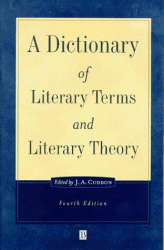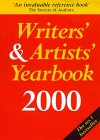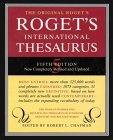


|
 |
|
|
|
|
Writers need to build up a library of writing books and references. The following are some must haves:  J. A. Cuddon, Claire Preston:
A Dictionary of Literary Terms and Literary Theory (HB)
J. A. Cuddon, Claire Preston:
A Dictionary of Literary Terms and Literary Theory (HB)If you are puzzled over the difference between a novel, a novella, and a novelette, or want to know what a bluestocking is, this book is for you. I got this book as a gift, and it has been one of the few times someone has gotten me a book in an area of my interest that has actually been useful. People often have a dictionary and thesaurus, and a few books on writings, but seldom think to get a book like this. More  Writers' & Artists' Yearbook 2000: A Directory for Writers, Artists, Playwrights, Writers for Film, Radio and Television, Designers, and Illustrators, (PB, 700 pages)
Writers' & Artists' Yearbook 2000: A Directory for Writers, Artists, Playwrights, Writers for Film, Radio and Television, Designers, and Illustrators, (PB, 700 pages)A must-have for any writer wanting to submit work to the appropriate publisher. Contains details on what each publisher is looking for, and how to submit your work, as well as articles on topics like copyright, agents, and other topics. Covers the various markets you can submit to. Not only useful for novice writers, but an essential reference for experienced writers who want to keep current with new markets and changing submission guidelines. 
Arthur Quinn: Figures of Speech : Sixty Ways to Turn a Phrase, paperback. "We was robbed!" was Joe Jacobs' exclamation into the ring announcer's microphone when he learned the boxer he managed had not been awarded the win. This is the first example of a figure of speech in this slim, pithy little volume... More |
Eloquent is as Eloquent Does by Carin Perron I have read and owned scads of books on writing, and of all the subjects I am interested in, writing, ironically, seems to have the greatest number of badly-written guides. My criteria for this list is simple: every book must be well-written and enjoyable to read. It must clarify and enlighten. It must have proven itself in use. These are books you will turn to again and again. Every writer should own The Practical Stylist, The Elements of Style, and a good Roget's Thesaurus, in its original form, not in the commonly-bowdlerized alphabetical synonyms and antonyms form. I would also recommend Figures of Speech, for expanding your ability to express yourself. Because these books have proven their usefulness in actual practice, this makes a good gift list for that someone you know who is interested in writing. For poets, I recommend one or more good rhyming dictionaries, like The Complete Rhyming Dictionary, Clement Wood (Editor): particularly one with details on formal verse (it's coming back, you know, along with narrative poetry!), and The Practice of Poetry, the only writing book I've ever seen that spends about half its pages on the really hard part, getting ideas and coming up with strategies for dealing with them. No, not only for poets -- I would even recommend this book to prose writers, just for the pre-writing section! The Practical Stylist helped me tutor kids in English, so I could be sure not to falter, even on the fine points, though my best guide for minutiae in language was a turn-of-the-century book called "A New Grammar," by Meikeljohn, not likely to be in print. Hint: if you want good books on grammar or painting, go for older ones, back when people still knew a lot of the stuff that has since been lost to us moderns. |
||
|
Reference 
Peter Mark Roget, Robert L. Chapman (Editor): Roget's International Thesaurus, (HB) The above thesaurus is not in dictionary form! Never, never, never buy or use a so-called thesaurus "in dictionary form": the thing is a contradiction in terms. There were dictionaries of synonyms and antonyms well before Roget: his revolutionary idea... More
Poetry
|
Prose  William Strunk, E. B. White: Elements of Style, (HB)
William Strunk, E. B. White: Elements of Style, (HB)As Arthur Plotnik, the accomplished editor says, "You don't refer to this quintessential little book of grammar, usage and writing tips; you re-read it, twice a year." More  Sheridan Baker: Sheridan Baker: The Practical Stylist, with Readings and Handbook, (PB) The Practical Stylist is the best all-around book on writing style I have seen, and is so readable, I couldn't put it down. It wasn't like taking my medicine, but sneaking another round of ice cream. ... This book taught me everything my grammar-hating teachers refused to. More |
|||

John Hollander: Rhyme's Reason : A Guide to English Verse, (HB) |
Inspiration & General Insight  Carolyn G. Heilbrun: Writing a Woman's Life, (HB). Mystery writer Amanda Cross tackles the idea of autobiography in genera,l and, in particular, women's struggle with their life stories. More Carolyn G. Heilbrun: Writing a Woman's Life, (HB). Mystery writer Amanda Cross tackles the idea of autobiography in genera,l and, in particular, women's struggle with their life stories. More
|
 No, I'm not kidding! This book is invaluable for coming up with names for characters in stories.
What Shall We Name the Baby? (PB), edited by Winthrop Ames (who helped many performers choose good stage names) is the best name book I've ever seen.
No, I'm not kidding! This book is invaluable for coming up with names for characters in stories.
What Shall We Name the Baby? (PB), edited by Winthrop Ames (who helped many performers choose good stage names) is the best name book I've ever seen.
|
||
|
Editing & Research  The Modern Researcher, (1992 ed.), Jacques Barzun & Henry Graff The Modern Researcher, (1992 ed.), Jacques Barzun & Henry Graff
This book has been around for more than 40 years, and is considered the classic reference on the subject. It has proven itself again and again through generations of scholars writing theses, but I found the book to be much more broadly useful. When my mother taught herself how to be a careful and conscientious genealogist, she was instinctively following the principles in this book. When I see people making sloppy mistakes, or flirting with intellectual dishonesty, I feel like handing them this book. While one of the lay reviewers on the Amazon site complained that this book was unreadable, I found it to be clear and simple and easy to follow. Not a book to be afraid of, this volume will take you by the hand, and help you do it right, whatever your project is.  The Elements of Editing, Arthur Plotnik The Elements of Editing, Arthur Plotnik
Written by a working editor for his own trainees, this book contains all the practical information you need to know about editing in the real world, that is, under time constraints, where you need to keep your priorities straight. Clarifies the different levels of editing, makes it clear what kinds of perfectionism is useful and which is obstructive. Contains a very good list of reference books for any editor's library. A very readable and fascinating book. The author makes the world of publishing, whether for periodicals or for books, come alive. Special Order and Out-of-Print Books Robin Skelton: The Practice of Poetry (Out of Print) This is the only writing book I've ever seen that deals with the big problem of writing: all the stuff before you put pen to paper. While the book deals with writing poetry, the first four chapters could be used to develop ideas in any writing form, not just verse. This book begins with a quote from Tony Connor on how to write poetry: "invent a jungle and then explore it." Robin Skelton, in this book, shows you how to do just this. You are into chapter three before you're even thinking of putting something halfway final to paper, and then for three more chapters, you look at the basics of poetry. The "Strategies and Programmes" chapter I have referred to again and again. Once you have something to say, what is your game plan? It is a practical book written by a practicing poet and teacher of poetry. Skelton has published books, and the head of the Creative Writing Department at the University of Victoria, British Columbia, Canada. A lively poet, he explains the practice of poetry like no one I've ever read. A must. Ray Bradbury: Zen and the art of writing and The joy of writing: two essays, (PB, Out of Print) When Is a Poem: Creative Ideas for Teaching Poetry Collected from Canadian Poets, Florence McNeil, comp.:
|
||||
|
|
|
|
|